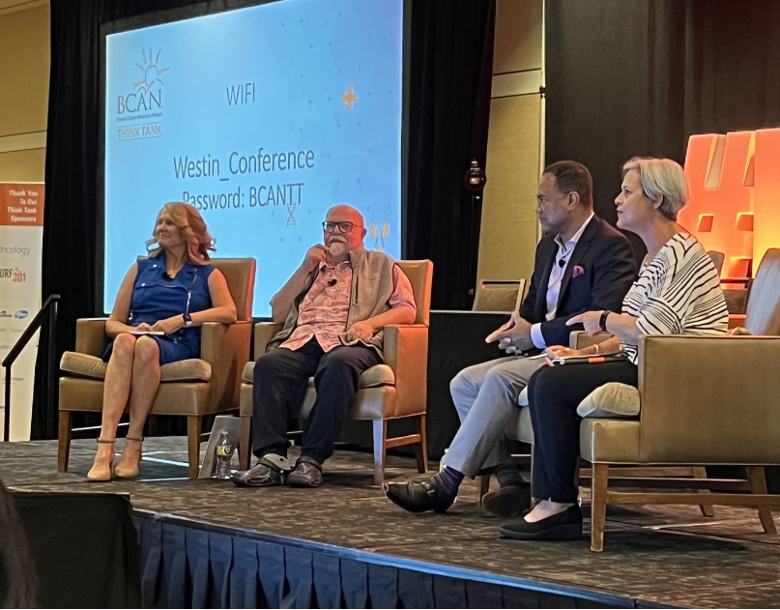(UroToday.com) An annual tradition started at the inaugural Think Tank in 2006 - bladder cancer survivors are invited annually to share their stories in an effort to bridge the gap between bladder cancer providers and their patients with regards to treatment goals, counseling, and survivorship. In lieu of a keynote address at the 2022 Think Thank, the meeting kicked off with a compelling Patient Voice Panel.
Led by BCAN co-founder Diane Zipursky Quale, three patients shared their experiences from diagnosis to survivorship- a triathlete and father who battled high-risk non-muscle invasive bladder cancer (NMIBC) managed with intravesical Bacillus Calmette-Guerin (BCG), a college professor who progressed along the bladder cancer disease spectrum from NMIBC to salvage systemic therapy after post-cystectomy recurrence ultimately, and a young woman who’s timely expert second opinion was vital for an aggressive histologic subtype.
The panel started off with a discussion on what they wish they had known prior to embarking on their bladder cancer treatment journey. While these patients now serve as thought leaders in patient advocacy for bladder cancer, their initial inclination after diagnosis was to take a passive role in treatment decision-making. They spoke about the importance of a patient-centered team that empowered them to ask questions and tailor their treatment to personal goals. In fact, all three patients ultimately sought care from bladder cancer specialists through a second opinion.
The patients were similarly unprepared for the feelings of isolation and how this impacted their morals and sense of self. One patient recapped her experience of admission for inpatient neoadjuvant chemotherapy during the height of the COVID pandemic, which precluded in-person support from her family and friends. Another discussed the overwhelming shock and isolation after receiving his bladder cancer diagnosis and treatment plan by phone, with little dialogue or opportunity to ask questions.
Lastly, each patient discussed the lack of disclosure on the impact of their treatment on sexual function. While this was the forefront of each patient’s mind, their provider teams were eager to initiate therapy with little or no discussion on sexual health ramifications. The patients admitted that this knowledge may not have changed their treatment plans, but would have emotionally prepared them to live their lives more fully into survivorship.
Bladder cancer is a disease marked by high recurrence rates after definitive treatment and the need for lifelong surveillance which can make the concept of cancer “cure” an abstract one for some patients. The patients discussed the toll that anticipation and anxiety played on their emotional wellbeing with each set of surveillance scans and cystoscopy. Rather than be cured, one patient recounts his ambition to be healed, which is simply an attitude which is attributable to each member of the treatment team and the patient themselves.
The session concluded with a call to action from patients as they discussed unmet needs in bladder cancer research and clinical care. Non-invasive alternatives to surveillance cystoscopy was a common theme, as was limiting treatment toxicity through more precisely targeted therapies, and alternatives to intestinal urinary diversion after cystectomy. One patient discussed his dream of making advanced bladder cancer a chronic illness through more effective systemic therapy so he could live a more meaningful life without the anxiety of disease progression or therapeutic intensification.
There is no one size fits all bladder cancer patient or bladder cancer journey. These patients courageously provided their testimonies as a reference for other patients, and a framework whereby bladder cancer clinicians and researchers can strive to move the needle towards more effective, tolerable, patient-centered care.
Presented by: Diane Zipursky Quale, Damon Thomas, John Lacey, and Margo Wickersham
Written by: Patrick Hensley, MD, Urologic Oncologist at the University of Kentucky (@pjhensley11) with Ashish Kamat, MD, Urologic Oncologist at MD Anderson Cancer Center (@UroDocAsh) during the 2022 Bladder Cancer Advocacy Network Think Tank (#BCANTT22) Wednesday, Aug 3 – Friday, Aug 5, 2022


